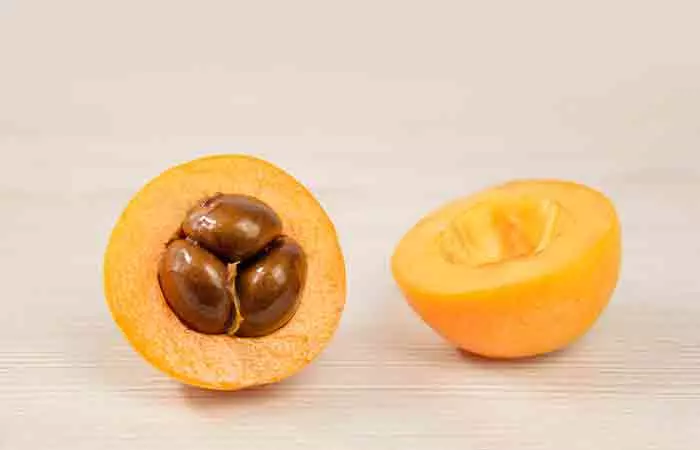Loquats (also called Chinese plums) have a round or pear-shaped body and yellow skin. Their flavor is similar to apricots and cherries. This fruit is commonly consumed raw and processed into jams, jellies, and juices. Loquat leaves, seeds, and fruit have a wide range of medicinal properties. Evidence suggests that loquats may contribute to heart health, reduce cancer risk, and prevent diabetes. They may also help reduce neurological stress, inflammation, and lower blood cholesterol levels. This article discusses the benefits of loquats, their nutritional profile, and any potential side effects. Keep reading.
What Are The Benefits Of Loquat Fruit?
1. Promotes Heart Health
Loquat is rich in potassium. The mineral acts as a vasodilator and reduces strain on the blood vessels (1). Potassium may also lower the blood pressure and protect the heart (2). The magnesium in the fruit is also essential for regulating blood pressure and boosting cardiac function (3). What Are Its Benefits? Loquat helps to treat diabetes, reduces the risk of cancer and also reduces neurological stress. Who Can Consume It? Anyone, especially people looking to lower cholesterol levels and improve heart health How Often? You can eat this fruit daily. Caution Loquat seeds are filled with poisonous cyanide chemicals, which can be fatal since they prevent the body from using oxygen.
The phenolic compounds in loquats may prevent cellular damage and reduce inflammation, thus improving heart health (4), (5). These phytochemicals exhibit antioxidant properties that may help reduce the risk of cardiovascular diseases. Studies have also found that foods rich in antioxidant effects may reduce the risk of heart disease (6), (7). Carotenoid concentrations in foods also reduce the risk of several heart problems (8).
2. May Reduce The Risk Of Cancer
Animal studies state that extracts of leaves and seeds of loquat possess anti-cancer properties (9), (10). Methanol extracts of loquat were found to help prevent the spread of human breast cancer cells (11). A study conducted by Okayama University found that polyphenols showed cytotoxic activityi A process or the ability of a substance to damage or eliminate living cells, including cancer cells. against human oral tumor cell lines (12). Loquats contain chlorogenic acid that may suppress cancer growth (9), (13). The acid prevents the spread of human colon cancer cells and leads to their death (14). Loquats contain beta-carotene. A study conducted by the Zhengzhou University found that beta-carotene might have anti-tumor effects (15).
3. Helps Treat Diabetes
Research shows that the extracts of loquat leaves and seeds may have an anti-diabetic activity. They may help in the control and prevention of type 1 and 2 diabetes (9). In a study conducted by the Central Taiwan University of Science and Technology on mice, loquat could lower blood sugar levels (16). Another study conducted by the Siebold University of Nagasaki on rats and mice found that loquat seeds exhibited hypoglycemic activityi A state that develops when blood sugar drops below normal and reaches a potentially dangerous level. (17).
4. May Offer Anti-Inflammatory Properties
Loquats possess anti-inflammatory properties. Diseases such as cardiovascular and neurodegenerative disordersi A group of conditions caused by progressive death of the nerve cells and affect brain functions. are associated with inflammation (18), (19). Loquat juice was found to have preventive effects on inflammation (20). In mice studies, fruit extracts of loquats were found to reduce inflammation caused by a high-fructose diet (21). More long-term research is needed to understand the effects of loquat on inflammation.
5. May Reduce Blood Cholesterol Levels
Loquat contains pectin, a type of fibre that may lower cholesterol levels. A study conducted by Maastricht University found that pectin reduces total cholesterol concentrations in humans (22). However, limited research is available in this regard.
6. May Reduce Memory Impairment And Neurological Stress
Loquat extracts reduce memory impairment and help prevent neurological stress. The carotenoid antioxidants in loquat combat the oxidative stress caused by free radicals. A study conducted by the Yonsei University College of Medicine found that loquat had neuroprotective effects. The fruit may act against memory impairment and oxidative stress (23).
7. Aids Digestion
The leaves of loquat are traditionally used for soothing the digestive system (24). The pectin in loquat can act as a digestive aid. A study conducted by the Shiga University of Medical Science on rats found that pectin might increase the amount of intestinal mucosa (25), (26). Dietary fiber can stimulate peristaltic motion (wave-like contractions) and promote regularity of bowel movements. In addition, the intake of loquats may help enhances immunity system function, improves eyesight, and boosts respiratory health (27). Many anecdotal evidence suggests that they may aid in weight loss, boost metabolism, and detoxification. Whereas, the leaves of loquat possess excellent anti-aging properties (24).
8. Relieves Sore Throat
Loquats may provide comfort for sore throats. A study on the anti-inflammatory qualities of fruit and vegetable juices, including loquat, observed that loquat juice showed potential anti-inflammatory effects (28). Further, loquat leaves contain essential oils that have expectorant and antiasthmatic properties which help relieve coughs, sore throats, and hoarseness. This therapeutic effect is due to anti-inflammatory chemicals present in loquat leaves such as ursolic acid (UA) and hawthorn acid (29). While research is still limited on its effectiveness in the treatment of sore throat, loquat, its leaves and other loquat substances do offer certain benefits that may help relieve it.
Loquat Nutrition Facts
Loquat is an excellent source of vitamins, minerals, and carbohydrates. It also contains monounsaturated fats like omega-3 and omega-6 fatty acids. The fruit is also low in cholesterol and calories as it hardly contains any lipids. According to the United States Department of Agriculture, one cup (149 grams) of loquats contains (30):
Energy: 70 kcal Protein: 0.641 g Carbohydrate: 18 g Fiber: 2.53 g Calcium: 23.8 mg Folate: 20.9 mg Vitamin B6: 0.1 mg
Additionally, loquats contain small amounts of vitamin B1, vitamin C, vitamin A, riboflavin, copper, iron, calcium, and phosphorus. These promising benefits and nutrition facts of loquat may have left you wondering how to have it. Check out the next section to know more.
How To Eat Loquat
You can consume the fruit in different ways. We have included a couple of simple recipes. Loquat Tea Ingredients
2 to 4 inch loquat leaves 2cups of water
Procedure Loquat Juice
10 loquats 1 glass of water 2 tablespoons of sugar 1 tablespoon of lemon juice A pinch of salt 1/4 teaspoon black salt (optional)
Procedure Jared Rydelek, a YouTube blogger, tried loquat and shared his experience of this delicious fruit. In his vlog, he states, “They are kind of interesting because if you eat like a lot of loquats there is a mild sedative effect…. There are some discrepancy on whether or not you should peel it or not peel it, some people peel it…. The skin is a little difficult to eat…. The texture’s a little bit soft and very juicy…, inside it’s got several like 3 or 4 of these seeds right here. The flavor is, it reminds me a little bit like the Ya pear [Japanese pear] of all things, it’s just like really really mild and juicy…. It tastes little bit like a pear, maybe with like a very mild peach or plum flavor to it (i).”
What Are The Side Effects Of Loquat?
Excess consumption of loquat may cause toxic myopathy. Limited information is available to conclude if the fruit may have any other side effects. Toxic Myopathy In a study, a patient with hypertriglyceridemia (high levels of triglyceridesi A type of fat circulating in the blood, and the body uses it as a primary source of energy. ) who had ingested 2 litres of loquat leaf tea in two weeks saw a remarkable decrease in triglyceride levels. However, he also experienced inflammatory myopathy (a muscle disease leading to muscle weakness) (31). No other documented adverse effects have been identified yet. Are loquat leaves poisonous? The young leaves of the loquat could be slightly poisonous. They contain cyanogenic glycosides that release cyanide into the system upon digestion. Can you be allergic to loquat fruit? Loquat fruit may cause allergies in some people. However, there is no scientific evidence to prove this point. Are loquat seeds edible? No, the seeds and young leaves of the loquat are not edible. They could be slightly poisonous due to the presence of glycosides. They are unsuitable for human consumption. How do you know when a loquat is ripe? A ripe loquat has a yellow-orange color at the top of its stem with no green. The loquat fruit needs to ripen on the tree itself. What do loquats taste like? The fruit tastes sweet when ripe and the flavor is a blend of citrus, plum, and apricot. Should loquats be refrigerated? If you want to store them longer then they should be refrigerated. Are loquats related to mangoes? No, loquats are not related to mangoes. Can you eat loquat skin? Yes, you can eat the loquat fruit skins. What is the difference between kumquats and loquats? While loquats belong to the family of apples, pears, and peaches, kumquats belong to the orange family. There are numerous kumquat benefits that make them a nutritious addition to your diet. Is loquat good for your liver? Possibly yes. Loquat contains polyphenols, which have potent antioxidant activities. These beneficial compounds may help protect the liver from fructose-induced fatty liver (21).
Illustration: Loquat: 7 Potential Health Benefits Nutrition Facts And Side Effects












